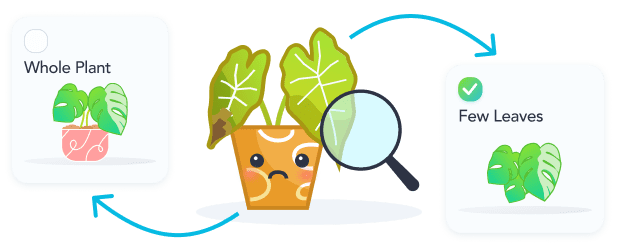Care Guides for Baby Rubber Plant
Every 7d
Recommended Frequency
1 /2 cup of water
Recommended Amount
Watering and Moisture For a baby rubber plant (Peperomia obtusifolia), it is generally recommended to water every 7-10 days. The frequency can vary depending on the season and indoor conditions. During the growing...
Every 120d
Recommended Frequency
Fertilizing your baby rubber plant (Peperomia obtusifolia) is essential for its healthy growth. The ideal frequency for fertilizing this plant is every 120 days, which translates to approximately every four months. ...
Indirect Sun
Recommended
The baby rubber plant (Peperomia obtusifolia) thrives best in bright, indirect sunlight. Direct sunlight can scorch its leaves, so it's important to avoid placing it in a spot where the sun's rays directly hit the plant....
Every 730d
Recommended Frequency
Repotting your baby rubber plant (Peperomia obtusifolia) is an essential part of its care routine. Ideally, you should repot this plant every 24 months, which equates to approximately 730 days. This frequency allows the ...
When caring for a baby rubber plant (Peperomia obtusifolia), maintaining the appropriate temperature is crucial for its health and growth. The ideal temperature range for this plant is between 60 and 75 degrees Fahrenhei...
Recommended Soil
When caring for a baby rubber plant (Peperomia obtusifolia), selecting the right soil is crucial for its health and growth. The ideal soil for this plant is peat soil. Peat soil is known for its excellent moisture retent...
When caring for a baby rubber plant (Peperomia obtusifolia), maintaining the right humidity is crucial for its health. This plant thrives in environments with humidity levels between 50% and 80%, which is considered high...
Questions about Baby Rubber Plant
A baby rubber plant, scientifically known as Peperomia obtusifolia, is a popular houseplant known for its glossy, spoon-shaped leaves and compact growth habit. It's an easy-to-care-for plant that thrives in indirect ligh...

Toxicity of Baby Rubber Plant

Common Pests and Diseases
Root Rot
Overwatering
To address root rot in baby rubber plants, first, cease watering immediately and allow the soil to dry out. If the plant is severely affected, remove it from its pot and trim away any black, mushy roots with sterilized scissors. Repot the plant in fresh, well-draining soil and a clean pot. Ensure the pot has adequate drainage holes. Going forward, water the plant only when the top inch of soil feels dry to the touch, avoiding waterlogging.
Leaf Droop and Discoloration
Underwatering
To address underwatering in baby rubber plants, ensure a consistent watering schedule that keeps the soil slightly moist but not waterlogged. Allow the top inch of soil to dry out before watering again. If the plant is severely dehydrated, immerse the pot in a water bath for about 10 minutes to rehydrate the soil evenly. Adjust your watering frequency according to seasonal changes, watering more during the growing season and less in winter.
Mealybugs Infestation
Mealybugs are small, soft-bodied insects covered with a white, waxy substance. They typically infest the undersides of the leaves and stem joints, sucking sap and weakening the plant.
To manage a mealybug infestation, start by isolating the affected plant to prevent the pests from spreading. Use a cotton swab dipped in rubbing alcohol to dab directly onto the mealybugs, effectively killing them on contact. For larger infestations, rinse the plant with a strong stream of water to dislodge the pests, or apply insecticidal soap or neem oil, following the product's instructions carefully. Regularly inspect the plant and repeat treatment as necessary until the infestation is under control.
Leaf Spot Disease
Fungal or bacterial pathogens
To manage leaf spot disease, start by removing and destroying any affected leaves to prevent the spread. Improve air circulation around your plant by spacing out plants and avoiding overhead watering to keep the foliage dry. If the problem persists, consider applying a fungicide or bactericide, following the product's instructions carefully. Ensure your plant is receiving the right amount of light and nutrients to boost its overall health and resistance to diseases.

Related Plants














